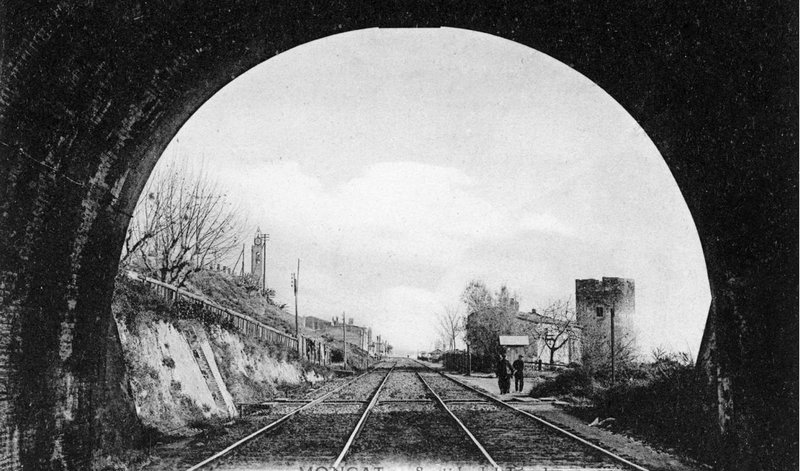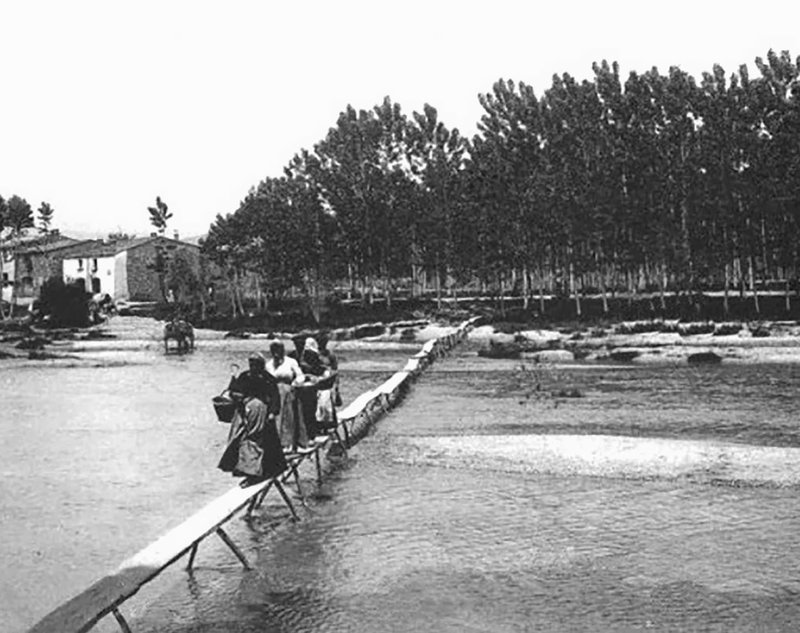A rude welcome
Expecting better luck, an aristocrat and her family experience an eventful welcome to Catalonia
Women Travellers in Catalan Lands
At Perpignan the traveller who is to journey into Spain is again obliged to betake himself to the old-fashioned mode of travelling by diligence, the railway north of Barcelona being opened only to Hostalrich and Mataro. […] We had a mayoral or guard, a driver, and two footmen. It was the duty of the latter to run alongside, to thrash the horses or mules, or to pelt them with stones when the road was bad, and to jump up and cling to the diligence when the road was so good as to enable them to strike into a trot. The approved plan of crossing a river is to send the footmen in advance to move any large stones, or fill any holes either in the bed of the river or on the opposite bank; after which they return to the diligence, and the team is made to charge it at full gallop, accompanied with yelling, hooting, pelting, jolting, and splashing; and after a most exciting rush, if fortunate, you arrive safe, although breathless, at the opposite side. The men soon after begin to smoke and sing as if nothing had happened[...]The country is varied with cork-trees, stone-pines, and long-stretching plains where rice and esparto are cultivated; the latter is much used for making matting and ropes. […] The distance is short to Figueras, where we slept and had our first specimen of a Catalan posada and its noisy inmates. The accommodation was scant and bad. […]
We were on the following morning transferred by our traitor diligence agent to a smaller and dirtier diligence, and were told we must go on by this or return to Perpignan for redress. We got moodily into our small confined vehicle, and drove several hours through a cultivated plain to Gerona […] On leaving Gerona, our mayoral coolly told us we could not possibly reach the station in time for the train for Barcelona that night. The roads now became execrable, full of holes, heavy clay and mud, through which our mules struggled and plunged. Our diligence lurched like a ship at sea, and it became darker and darker. We felt very anxious as to our long lone road leading through rivers, mire, and mud; at one time we came to a dead stop, caused by eight mules being all down at once. After much confusion and noise, they were got up, and constrained by thrashing and abuse to renew the struggle; for some miles we continued to go on in the same manner, making some tremendous lurches, from which we miraculously recovered our balance; at last fortune deserted us, we lurched, quivered in the air for a second or two, and went over. The diligence fell partly on a sloping bank, and we were not in a completely horizontal position, those who were uppermost were enabled to avoid crushing their neighbours to death. By the help of the mayoral we were dragged out one by one, and put down in the mud without any serious injury. There we were in the dark, but most thankful to be without broken bones. Our Spanish maid and the mayoral had been sitting in the front: they had made a flying somerset over the mules, and had lighted on the opposite bank; the former so confused with her fall, she could not at first answer to her name, and we were apprehensive that she had been killed on the spot, and were greatly relieved at last to hear, from beyond the mules, a feeble voice telling us she was not much injured. […] A friendly lantern made its appearance in the hands of a man who had seen our downfall, and we all trudged through the mire, and after half a mile's walk arrived at a temporary wooden station at Palma, two miles from Hostalrich, at 11 o'clock P.M. Here we were told there was no train till six o'clock the following morning, and no other shelter than this in the neighbourhood. The station was full of wild-looking Spaniards, congregated around small tables, drinking Catalan wine and coffee, and singing and making merry over it. They at first stared at us as interlopers, but soon got tired of that. In the meantime we ingratiated ourselves with our hostess, who magnanimously offered to transfer a bedful of children to a darker and dirtier den, and put all the ladies of our party into their bed: this did not suit our ideas of comfort; we preferred waiting till the Spaniards retired, and then arranged to pass the night upon the tables and chairs, and rough it as well as we could, somewhat comforted by knowing that a strong guard of men had been placed around the station to protect ourselves as well as our luggage.
LadyDunbar
Born in Tranmere, near Liverpool, Sophia Orred (1813-1909) was the only child of George and Frances Orred. Throughout her life she had the opportunity to pursue her interest in the arts and develop her artistic skills, exhibiting her drawings and watercolours in such venues as the Royal Academy, the Royal Scottish Academy and the Society of Female Artists. In 1840 she became the second wife of Sir Archibald Dunbar of Northfield, and henceforth was known as Lady Dunbar. The family resided in Elgin and made occasional trips to the warmer lands of the South. One journey became the subject of her book A Family Tour Round the Coasts of Spain and Portugal during the Winter of 1860-1861 (1862). The family travelled from late October of 1860 through early May of 1861, following Spain's eastern coast and then spending several months in Andalusia as well as to Tangier and Lisbon. Despite their wealth and the fact that they were accompanied by a Spanish maid, the given excerpt shows that their wanderings by no means offered risk-free experience. The book did not receive good reviews. Most critics recognized Lady Dunbar's energetic spirit but also affirmed that many of the data she described was redundant. The Saturday Review lamented her carelessness at misspelling foreign place names, even the Catalan ones, affirming in such case that “we must not allow an ancient and noble tongue to be ignored and slighted as a mere patois of Spanish...”




